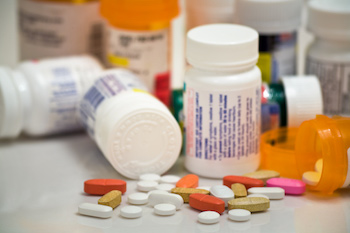
When the liver works properly, you don’t notice it. It works in the background, cleansing the blood, fighting infections, helping you digest your food and storing energy. Unlike, say, your heart or your stomach, it’s an organ that regenerates, or grows back, when it’s damaged. But for all its workhorse tendencies, the liver is vulnerable to damage and injury from many factors. Diet, environment and genetics all factor into whether you’re at risk for liver disease. And when something prevents the liver from working properly, it can cause serious illness and even death.
Symptoms of Liver Disease
The average person doesn’t know much about the liver until a diagnosis or until an unintentional acetaminophen overdose — which is more common than you think.
“The liver is like a black box,” says Stephen Caldwell, MD, professor of hepatology at UVA. “Some patients get referred to the liver team from their primary care doctor complaining of just feeling crappy.”
They might have a tender abdomen and have a yellow cast, or jaundice, to their skin. This could mean that they have liver disease, which falls into these categories:
- Infections — this refers to hepatitis B, C, D, A and E, which are all caused by viruses
- Fatty liver – obesity and diabetes-related cirrhosis
- Autoimmune liver disease — when the immune system attacks the liver
- Alcohol-related Liver Disease — caused by drinking too much alcohol
- ‘DILI’ (drug induced liver injury) – liver disease caused by medications, including supplements and acetaminophen
Acetaminophen & Overdosing
One of the craziest things Caldwell talks about was how common it is for people to unintentionally overdose on acetaminophen (Tylenol).
“Once or twice a month we’ll get someone who has a problem like joint pain or dental problems and wound up having acute hepatitis,” he says.
Since acetaminophen is over the counter, many people think it’s benign, so they ignore dosage guidelines. They’ll either take too much all at once, or they’ll take it too frequently, especially if they are still in pain. When combined with alcohol, the danger increases.
Toxic Supplements
Federal law does not require supplements to be proven safe before they are marketed, and the dose on the bottle or package isn’t always accurate. Caldwell describes patients who were otherwise physically fit and active and wound up on the liver transplant list from taking green tea extract. Skullcap and valerian are among many other supplements that are potentially toxic, especially if they interact with:
- Other supplements
- Alcohol
- Grapefruit
- Prescription drugs
- Acetaminophen
Caldwell urges everyone to follow the dosage guidelines for them and for children, who are especially vulnerable to liver damage from overdosing on acetaminophen.
Alcohol, Lifestyle & Your Liver
People often associate liver disease with excessive alcohol. However, the quantity of alcohol that leads to alcoholic liver disease or cirrhosis is not the same with every person. “Genetics plays a big part,” says Caldwell. “We’ve all heard of an alcoholic that never develops liver problems, and there’s always the person who drinks much less but who does develop it.” A person’s individual biochemistry and genetics play a role that’s still being examined.
Lifestyle and changing societal norms also play a part. Binge drinking, which used to be common only in men, a relatively new phenomenon, especially among women, has left some women in their late 20s and early 30s with liver damage, which used to be common only in men. “Young, professional women are among the largest growing population with advanced alcoholic liver disease,” Caldwell says.
Similarly, lifestyle factors into non-alcoholic fatty liver disease. Obesity, hyperlipidemia (a high concentration of fat like cholesterol or triglycerides in the blood), diabetes and lack of exercise play a part in developing this disease. So does eating or drinking high-fructose corn syrup (HFCS), especially in the form of soda and sweetened beverages.
Do You Have Jaundice and Tenderness in Your Abdomen?
Contact your primary care doctor.
“We’ve known since the 1990s that HFCS is implicated in fatty liver disease,” Caldwell says. “This particular form of sugar is super absorbable, so it converts to fat faster.”
How to Keep Your Liver Healthy
While Caldwell doesn’t advocate liver cleanses or other remedies, and some genetic and environmental factors are beyond your control, there are a few things can help keep your liver healthy:
- Limit alcohol
- Avoid illegal drugs — not just for toxicity; needle-sharing spreads hepatitis C
- Practice safe sex — hepatitis B (and sometimes C) can be transmitted through sexual contact
- Wash your hands when handling food — hepatitis A and E are foodborne illnesses
- Follow recommended dosages for pain medication
- Be aware that supplements can carry serious risks
- Always tell your doctor all the medications and supplements you’re taking to reduce the risk of drug interactions and liver toxicity
- Maintain healthy weight
- Exercise
- Avoid HFCS


I DO ENJOY READING ALL YOUR ARTICLES AND HOPE THAT YOU WILL CONTINUE.
Hello I am writing to you because I have previously had hepatitis C which was either metastasizing or preparing to when they discovered it approximately 16 years ago. I went through a series of treatment which was one and a half years long. It was three six month sets of treatment and the last two had to be something because the doctor thought the first treatment was working and then all of a sudden it went Kaboom and went backwards. I now have suffered broken bones Galore which is a side effect well known. Also 3 tremendous bad car wrecks. I have had so many hospital stays emergency stays and office visits for the last 14 years that they should put me as a poster child. Right now for pain I am taking Gabapentin in high doses and also Aleve in high doses. It is the only over the counter that I can tolerate
I have always from birth had adverse reactions to acetaminophen and aspirin. My question to you is how do you see these medicines in in light of my previous liver treatment? And can you recommend something different that myself and my doctor might not be aware of?
Thanks for such a helpful article. Actually, I was addicted to alcohol and sometimes I also used to intake drugs. It was harming my liver so badly and I was getting exactly the same symptoms you have mentioned above. Before it gives more damage I immediately contacted the hope house rehab center for my treatment.
This article is really helpful, I must share this with my friends.